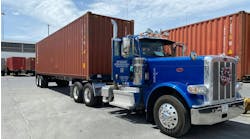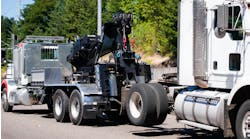In a report titled “Air Pollution: EPA Could Take Additional Steps to Help Maximize the Benefits from the 2007 Diesel Emissions Standards,” the Government Accounting Office (GAO) gave its assessment of the impact of emissions rules on trucking.
GAO looked at the effects '02 requirements have had on the industry, as well as the potential impact of the more stringent '07 regs. As the title of the report indicates, GAO also made some recommendations to help ensure an effective transition to the upcoming rules.
EPA is not entirely pleased with the GAO's recommendations. However, I feel that the agency has made some inaccurate assumptions about issues related to the '07 emissions standards.
First of all, EPA assumes that the '07-compliant engines will be ready for sufficient real-world testing in 2005. Second, it assumes that the re-formulated fuel required will be available in time for the '07 deadline. Third, the agency has made some seemingly modest assumptions about the cost of the new engines.
The GAO report correctly points out that these assumptions are, well, assuming a lot. As far as sufficient field-testing, things look a little shaky. There are no '07 engines in use yet — development is still under way — and manufacturers' estimated delivery date of mid-2005 is just that — an estimate.
Regarding fuel, it seems likely there will be distribution problems that EPA has not fully recognized. Even if the fuel can be produced on schedule, there is no guarantee that it will make it to market in time to replace all of the current fuel — and without being contaminated by it. Fleets that use contaminated fuel, even unknowingly, will be in violation of the '07 rules since particulate traps could quickly become contaminated.
Finally, GAO has determined that EPA estimates of costs associated with installation and use of '02 engines were significantly lower than the actual costs. In all fairness to EPA, however, those estimates had been calculated in 1998 and had no basis in reality. This time around, however, we have a much better feel for the additional costs that are likely to be incurred — and they are significantly higher than what EPA is estimating. In spite of this, EPA does not intend to change its estimate.
That said, I must confess that I am truly disappointed in the GAO effort to assess the '07 engine emissions issue. My experience with the GAO in other areas is that it can be counted on to take a thorough look at a situation, analyze pertinent events, and make appropriate recommendations. In fact, GAO recommendations are usually so carefully thought out that the parties involved have no problem accepting them.
Congress relies on the GAO to ensure that the agency in question has followed the intent of the legislation in a fair and appropriate manner. In its report on diesel engine emissions, however, GAO failed to do any analysis, apart from a sophomoric estimate of the pre-buy, and made no recommendations for adjustment.
Consequently, I have two recommendations for fleets using diesel engines in vehicles with GVWs of more than 8,500 lb. First, write to your Congressperson and Senators. Ask them to extend the deadline for testing the '07-compliant engines to January 2008.
Second, provide your state and national trucking associations with details about any experience you have had — good or bad — with the '02 engines. It may surprise you to know that EPA and GAO based their opinions on information collected from less than a dozen fleets. This small sample size can't possibly provide meaningful results. It's time for your voice to be heard.
So if you don't belong to a state or national trucking association, send your results to me. I'll make sure they get to the right party.


